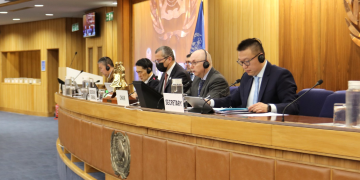The UK Chamber of Shipping has responded to the publication of the Government’s reply to the Environmental Audit Committee (EAC) Report on Net Zero and UK Shipping.
The EAC on 13 February published the Government’s response to its predecessor Committee’s report on ‘Net zero and UK shipping’.
The UK Government has accepted the following recommendations from the Environmental Audit Committee on shipping emissions:
-
International shipping GHG emissions regulation: The Government accepted the recommendation to continue working at the IMO (International Maritime Organization) to adopt effective regulatory measures for shipping emissions and to press for a 2028 Greenhouse Gas (GHG) Strategy.
-
Implementation of IMO conventions: The Government committed to working with flag states to ensure full implementation of IMO conventions on maritime GHG reductions and to support capacity-building.
-
Assessing UK’s contribution to international shipping emissions: The Government agreed to urgently assess the merits of introducing a voyage-based measure for the UK’s contribution to international shipping emissions and to legislate for the inclusion of international shipping emissions in the Sixth Carbon Budget.
-
Setting interim targets for emissions reduction: The Government accepted the recommendation to set stretching but achievable interim targets for both UK domestic and international shipping emissions, aligned with the overall 2050 net-zero target.
The UK Chamber of Shipping responded to the publication of the Government’s response echoing calls by the Chair of the EAC, Toby Perkins MP, for the Government to release their decarbonisation strategy without delay.
Commenting on the Government’s response, Peter Aylott, Director of Policy, UK Chamber of Shipping, stated that the Government’s response and the EAC’s continued focus on the pathway to Net Zero for UK Shipping is welcomed.
We are proud to have led the way in calling on decarbonisation, and the UK Chamber was the first national shipping association to publicly call for the global shipping industry to reach net zero emissions by 2050, prior to the UK Government and IMO Commitments.
…said Peter Aylott.
Aylott continued by commenting that the Chamber supports the Committee Chair’s calls for clarity from Government on their strategic direction towards a Net Zero future for the UK domestic and international shipping sectors, and will continue to work with the Government to deliver the shared goal of a green, thriving UK Shipping sector.
We look forward to the publication of the Government’s maritime decarbonisation strategy, as a much-needed successor to the 2019 Clean Maritime Plan.
…Aylott pointed out.
Alongside a decarbonisation strategy, placing the net zero shipping at the heart of considerations in the upcoming Spending Review, will be essential in securing the green transition, and ensuring that the UK maritime sector does not fall behind in reducing emissions.
This should include a focus on investing in sustainable fuels, in parallel with other sectors such as aviation, and infrastructure investment in the grid, to ensure adequate capacity for shore power, says Peter Aylott.
He continued by highlighting that it is vital to provide the industry and investors with confidence to aid the sector in its drive to reach net zero. To achieve this, a multi-year plan needs to be in place, which creates a framework for public and private sector collaboration and a pathway for emissions reduction.
With the right support, the UK could become a leading hub for green innovation and technology, creating increased opportunities for growth and employment within a green fuels supply chain.
…noted Peter Aylott.
It’s worth noting that the UK Government also:
- Partially accepted the recommendation to monitor the progress of international shipping emissions reductions in line with UK carbon budgets and net-zero goals.
- Noted the importance of working with the IMO but emphasized that international agreements are necessary to ensure consistency across the sector.
- The Government also noted the recommendation to consider fiscal incentives and other measures to encourage investment in green shipping technologies. However, it did not commit to specific actions but noted that work is ongoing to identify how best to support decarbonization in the maritime sector.
- Accepted the need for enhanced engagement with the maritime sector but noted that the industry itself must lead on technological innovation and emissions reductions.
- Noted the need for creating fuel standards, particularly regarding low-carbon fuels. It partially agreed, stating that the development of such standards should be pursued through international cooperation, mainly through the IMO.
Moreover, on the recommendations regarding international efforts to reduce maritime emissions led by the IMO, Peter Aylott noted that “We welcome the focus from the Committee on the international nature of the shipping industry and support the Government engagement in shaping the global agenda at the IMO.”
As the IMO develops economic and technical measures for international shipping , the global primacy of these measures must be recognised, ensuring a clear and harmonised regulatory environment that supports both UK and global decarbonisation efforts.
…concluded Peter Aylott.



































































